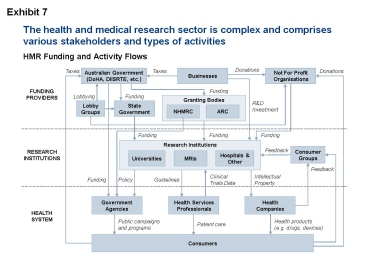Hmm, that went well. The McKeon Review was established late in 2011 to recommend a ten year strategic health and medical research plan for the nation. Many medical research institutes, researchers and patients (sometimes called consumers) made submissions. In relation to the last category, some of these submissions were under the umbrella of consumer organisations, while others were individual.
I led the development of a submission that represented a group of six people who had served on National Health & Medical Research Council committees during the 2009-2012 triennium. We weren’t representing the NHMRC, but we were using our collective wisdom to provide input to the Review.
The gist of our submission was:
- Great strides have been made in medical research over the years, but clearly there is more to be done. In order to stop medical research becoming a political football, funds should be quarantined to support medical research. Drug companies should also contribute to a pool of research funding.
- All health and medical research should be filtered through NHMRC so as to ensure we are targeting research, not duplicating efforts and removing competition between the Australian Research Council and the NHMRC. Ultimately, the outcome will be better health care that is evidence based.
- One of the cornerstones for the future in health and medical research is that patients want to be more involved as partners rather than as objects (see my previous blog). NHMRC has developed a consumer participation statement which is poorly understood or taken up by researchers. An implementation plan that genuinely involves consumers is the important next step. Consumers need to be part of the agenda setting for research, mostly because we cannot afford curiosity research.
- The senior health and medical research workforce does not make enough use of women in that sector. Most of the senior grants go to men. Women don’t apply for grants for a range of reasons, and this process needs changing. A blog on this topic by Discover Magazine is worth a read.
- Recent health reform initiatives have seen many new organisations developed, each of which has its own agenda. We need linkages between these new organisations and the health and medical research sector so that our collective focus is on ensuring that Australia has a high quality, evidence based, health care service that is cost effective and easily accessible.
- Australia’s role as a good citizen in relation to global health needs a better focus so that our aid dollars are appropriately targeted.
The consultation paper that the McKeon Review has issued for public comment (comments close on 31 October 2012) ticks building the NHMRC to the pre-eminent organisation it is supposed to be but has made fleeting reference to patients. In the Review’s vision for better health through research (p.10), sadly patients don’t get a look in:
However, patients do make Exhibit 7 (p. 16), noting that the health and medical research sector is complicated and comprises many stakeholders. Unfortunately, the patients are at the bottom, rather than at the top or in the centre or embedded:
I will write to the McKeon Review, but I thought we had come a lot further than this by 2012. It would make a grown girl weep, really.
PS: Since publishing this blog, it has been republished at Croakey.


It is interesting that consumers/patients are not seen to have any need to be involved in the vision for ‘better health through research’ and that when there is a mention it is to provide a feedback loop not as an integral part of the MAIN game. I to thought we had come a lot further than this.